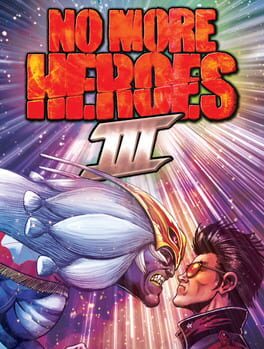This review contains spoilers
It's kind of hard to keep expectations in check for this title considering it's been in the works for a few years and it marks the end of a mini-era for Grasshopper Manufacture looking back at its past IPs that began with the remake of The Silver Case in 2016. How do you bring a conclusion to the 14-year arc of Travis Touchdown? The simple answer is, you don't. His development has already finished at TSA, and while he's not devoid of depth here as his brush with death late in the game explores, there's also not really a way to put a nice bow on his character, and GM doesn't even begin to try and instead lets other aspects of its presentation represent what it really means for NMH and the studio as a whole.
This game, to me, is the culmination of NMH as a "found family" story. Our cast of (no more) heroes are a bunch of dysfunctional weirdos alienated by the mainstream that eventually rally together to avenge the death of one of their own. Travis rejects his biological brother Henry one last time in favor of the other bonds he's created, while Bad Girl is able to accept the death of her father through the support of Travis and others. As darkly hilarious as it is to see Travis help Bad Girl with the process of grief by recommending Tomino anime, there is something genuinely sweet about the way he relates his own impact by said stories to her, as he's really trying in his own way to help.
It's also a celebration of otaku media that is often dismissed as "silly" for their excess. This is present in other NMH titles, but I feel it hits here hardest as Travis's character development is practically complete and yet he still embraces tokusatsu and anime even as both he and the game poke fun at them. There is no longer a sense of childishness attached to them as in the first game, as now it practically screams "yeah it's weird, and what the hell are you going to do about it?" I really don't understand how this game's teasing admiration could be mistaken as disdain by a few journos when no writer could be both so precise and wide-ranging in their references without a deep investment themselves.
I haven't even brought up the gameplay, and to be honest, I really don't have a lot to say about it. I miss the levels that had to be traversed before bosses and think the presentation of the designated matches are rather lazy, but at least combat itself is engaging enough and stays in the spirit of NMH. Only a few boss battles in this game really stuck out to me as particularly memorable (Kimmy, Midori, Henry) but I wouldn't say the other bosses were bad by any means, just a little disappointing considering the incredibly memorable bosses of the first two games. At the end of the day, NMH3 is a game that is more than the sum of its parts, a reflection of the rich style and history of its developer and a pledge to never lose their edge.
This game, to me, is the culmination of NMH as a "found family" story. Our cast of (no more) heroes are a bunch of dysfunctional weirdos alienated by the mainstream that eventually rally together to avenge the death of one of their own. Travis rejects his biological brother Henry one last time in favor of the other bonds he's created, while Bad Girl is able to accept the death of her father through the support of Travis and others. As darkly hilarious as it is to see Travis help Bad Girl with the process of grief by recommending Tomino anime, there is something genuinely sweet about the way he relates his own impact by said stories to her, as he's really trying in his own way to help.
It's also a celebration of otaku media that is often dismissed as "silly" for their excess. This is present in other NMH titles, but I feel it hits here hardest as Travis's character development is practically complete and yet he still embraces tokusatsu and anime even as both he and the game poke fun at them. There is no longer a sense of childishness attached to them as in the first game, as now it practically screams "yeah it's weird, and what the hell are you going to do about it?" I really don't understand how this game's teasing admiration could be mistaken as disdain by a few journos when no writer could be both so precise and wide-ranging in their references without a deep investment themselves.
I haven't even brought up the gameplay, and to be honest, I really don't have a lot to say about it. I miss the levels that had to be traversed before bosses and think the presentation of the designated matches are rather lazy, but at least combat itself is engaging enough and stays in the spirit of NMH. Only a few boss battles in this game really stuck out to me as particularly memorable (Kimmy, Midori, Henry) but I wouldn't say the other bosses were bad by any means, just a little disappointing considering the incredibly memorable bosses of the first two games. At the end of the day, NMH3 is a game that is more than the sum of its parts, a reflection of the rich style and history of its developer and a pledge to never lose their edge.
